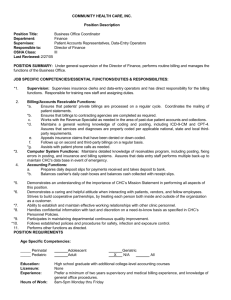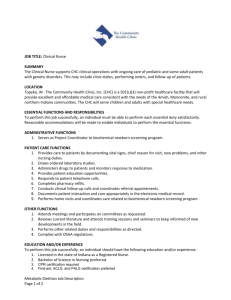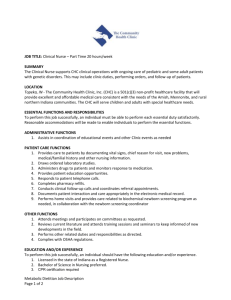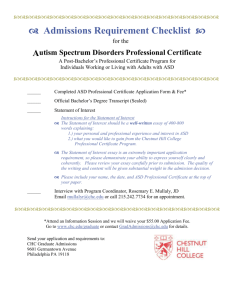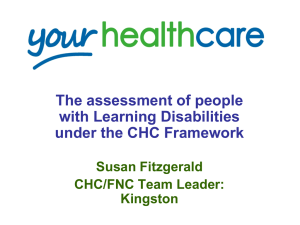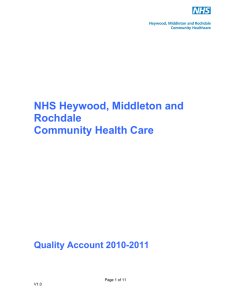Introduction to CHC Finance and Operations
advertisement
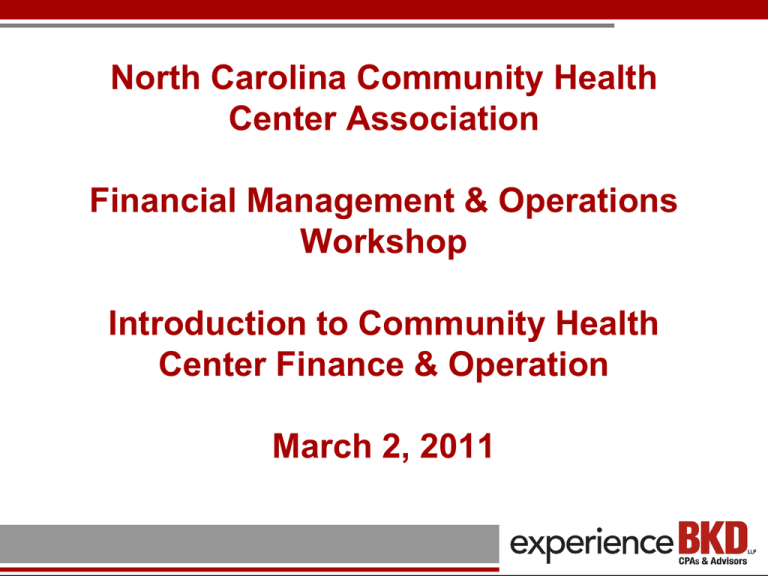
North Carolina Community Health Center Association Financial Management & Operations Workshop Introduction to Community Health Center Finance & Operation March 2, 2011 Today’s Agenda How do we get paid? What is unique about CHC accounting? Received a CHC grant; what strings are attached? All I need to do is break-even, right? Other issues & questions & answer forum How do we get paid? Payment Methods Cost-based reimbursement Prospective payment system (PPS) Fee schedule reimbursement Patient co-payments Grants Donations Other Medicare and Medicaid Best payers (typically) A community health center should market its services to these patients Understanding the cost reporting process is a must; not understanding can result in a reduction of revenue (sometimes significant) Problem of unbilled services (Part B, etc.) Revenue Cycle Proper management of the revenue cycle is a fundamental necessity of operating a community health center Breakdowns in any area of the revenue cycle cause delay or prevent proper cash flow What are the components of the revenue cycle? The Revenue Cycle Charge structure Appointment taking Patient registration Patient check out Charge capture Third-party billing Patient collections Cash receipts/collections Appointment Taking Be careful multi-tasking appointments with registration & check-in Provider scheduling should provide for sufficient patient volume No-shows should be addressed with scheduling policies Financial responsibility should be discussed when making appointment Registration – Common Problems Failure to recruit & pay appropriately Lack of communication & cooperation with billing Not verifying third-party coverage Failure to request updated information at every visit Failure to proactively address registration errors which impact billing processes Failure to collect patient amounts owed Excessive wait times due to lengthy registration processes Check-Out Process Lack of a check-out process is a common problem in community health centers A reasonable attempt should be made to collect outstanding balances due from the patient Collection training may need to be provided Charges should be input at check-out if possible Charge Capture – Common Problems Not accounting for numerical sequence of fee tickets Not recording all charges on a fee ticket Lost or missing fee tickets Not capturing all charges Not utilizing system generated fee tickets Not requiring providers to complete the encounter form during the visit Third-Party Billing - Problems Failure to bill all reimbursable services Failure to identify correct primary payer for each claim Not billing timely (within two days of date of service) Failure to monitor claim denial trends & correct errors at the source, including follow-up on all denials Lack of knowledgeable billing staff Improper coding Patient Collections - Problems Not having or following patient collection policies Lack of focus/priority on patient collections Not collecting everything possible (co-pays, deductibles, coinsurance & balances from previous visits) at the timeof-service Not following up on past-due accounts timely Not reviewing detailed accounts receivable aging reports monthly Not having sufficient personnel to allow for collection activities Cash Receipts/Collections Cash drawers should be balanced regularly and all cash deposited daily Receipts should be issued for in-office payments If you can post payments and record adjustments in the practice management software, you should not have access to cash What is Unique About CHC Accounting? This is not Your Typical Not-forProfit Model A set of financial statements exist for health care organizations Developed by AICPA Tailored specifically to examine the financial health of a health care entity A copy of the health care audit guide should be maintained on site for reference Health Care Financial Statements Balance Sheet Statement of Operations Statement of Changes in Net Assets Statement of Cash Flows Footnotes specific to a health care organization Generally Accepted Accounting Principles (GAAP) Accrual based accounting is required (no cash basis financials) Interim financial statements should also be prepared on the accrual basis & in accordance with GAAP Estimates are important in health care financial statements Accounting Estimates Allowance for doubtful accounts – measures at any given date, what amount of gross patient accounts receivable may not be converted to cash (not collected) Due to/from third party payers – mainly results from cost report settlements – should be accrued in the period earned Grants vs. Contributions These transactions may seem similar but they are accounted for differently Grants – (exchange transactions) – typically come from governmental agencies – revenue recorded when earned Contributions – (non-exchange transactions) – revenue recorded when promised – net assets restricted until donors intent has been fulfilled Received a CHC Grant; What Strings are Attached? Grant Funds: No Strings Attached? If you accept the grant, accept the rules It is the responsibility of health center management to understand the set of rules that accompanies each grant award Non-compliance with any grant rules could result in significant risk to those with fiduciary responsibilities at the health center (e.g. grant reporting) Managing Federal Grant Funds Governing federal regulations OMB Circulars A-110, A-122 & A-133 A-110 - Management of federal grant funds A-122 - Cost principles A-133 - Audit requirements Applicable to Section 330 funding Important for health center management to be familiar with applicable federal regulations Available on Internet Managing Federal Grant Funds Important to establish consistent draw down policies & processes Consider establishment of a separate bank account (interest bearing) for federal grant funds for tracking purposes Federal reporting accomplished through submission of an annual Federal Financial Report (FFR) Documentation is King It is important to maintain detailed grant files for each grant your organization receives These files should be maintained for at least three years after the acceptance of the grant’s FFR Although the FFR is completed in the aggregate, it is important to be able to identify specific expenditures that were charged to each grant Contents of Grant File Grant application Notice of grant award (all copies, all pages) Copies of all correspondence between your organization & the granting agency FFR & UDS Copy of audited financial statements Detail record of all fixed assets purchased with grant funds Accounting for Grants Accounting for grants includes a variety of unique financial issues Grant draw processes & procedures Cash management issues General ledger maintenance Revenue & expenditure recognition Grant reporting Scope of Project Important to know what activities are included & excluded from your scope of project as defined by the BPHC Changes in the scope of project should be communicated to & approved by the BPHC in writing Important to designate management level position to monitor compliance Scope of Project Risks of not including qualified health center activities in the scope of project FTCA Coverage Medicare & Medicaid FQHC reimbursement Pharmacy benefits Other? PIN 98-23 Financial System Expectations Accounting & Internal Controls Budget Billing & Collections Independent Financial Audit Accounting & Internal Controls Systems should be appropriate to size & complexity of the organization Accounting system should be based on GAAP Designed to accurately reflect financial performance Separation of financial functions should be implemented to safeguard assets Access function Recording function Monitoring function Accounting & Internal Controls Routine financial reports should be generated Reviewed by appropriate management staff Reviewed by members of the health center’s governing body on a regular basis (monthly) Should accurately reflect current financial status Allow for comparisons to past & projected financial position Budget Reflects the level & scope of services to be provided within the constraints of the health center’s resources Should reflect available resources & required expenditures Should be approved by the health center’s governing body Particular emphasis on health center revenue streams All I Need to do Is Break Even, Right? Mission vs. Business In order for a CHC to be successful, the mission & business side must be equal. If they ever get out of balance, a CHC can easily fail. A CHC must have positive operating margins to establish reserves, replace equipment, etc… Mission vs. Business Not-for-profit is a tax status The Bureau of Primary Health Care is encouraging health centers to establish reserves to help ensure that the CHC will operate in perpetuity Salary Related Issues A CHC is often a training ground for other local health care providers (especially billers) Be competitive – it costs much more to train a new biller than to increase the salary of your existing one Same goes for other key CHC employees Expansion Issues Change of scope & provider number issues Grow wisely Do the financial due diligence before you expand Quick expansions can have severe negative financial consequences Questions and Discussion Jeffrey Allen, CPA Partner jeallen@bkd.com 910 E. St. Louis St. Springfield, MO 65801-1190 Office: 417.865.8701 Fax: 417.865.0682 www.bkd.com Thank You!
